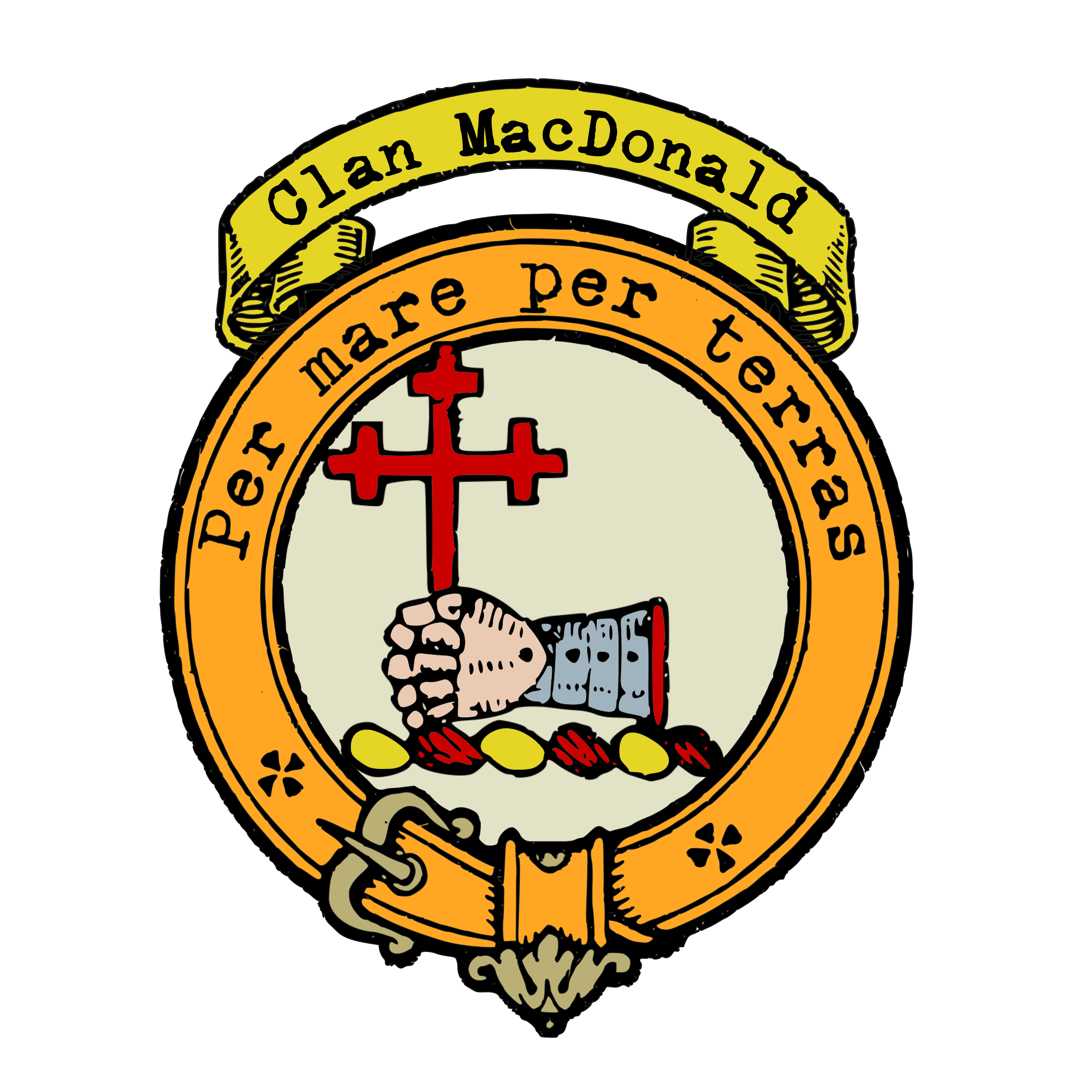Clan MacDonald
|
|
CREST: On a crest coronet Or, a hand in armor fessways couped at the elbow proper holding a cross crosslet fitchy Gules MOTTO: Per mare per terras TRANSLATION: ‘by sea and by land VARIATIONS: McDonald, Donald |
 Clan MacDonald traces its ancestry to Dòmhnall Mac Raghnuill, whose father, Reginald or Ranald, held the titles of “King of the Isles” and “Lord of Argyll and Kintyre.” Their dynastic lineage, together with Clan MacDougall, forms the Clann Somhairle, both claiming descent from the legendary Somerled. This Gaelic warrior and ruler had connections to the High Kings of Ireland, Colla Uais, and Conn of the Hundred Battles, further cementing Clan Donald’s prestigious heritage. Clan MacDonald traces its ancestry to Dòmhnall Mac Raghnuill, whose father, Reginald or Ranald, held the titles of “King of the Isles” and “Lord of Argyll and Kintyre.” Their dynastic lineage, together with Clan MacDougall, forms the Clann Somhairle, both claiming descent from the legendary Somerled. This Gaelic warrior and ruler had connections to the High Kings of Ireland, Colla Uais, and Conn of the Hundred Battles, further cementing Clan Donald’s prestigious heritage.
Throughout its history, Clan MacDonald produced numerous fearless warriors and strong chiefs who played crucial roles in Scottish conflicts. In 1263, during the Scottish-Norwegian War, Clan MacDonald’s chief, Aonghas Mor, pledged allegiance to the victorious Alexander III of Scotland after defeating Haakon IV of Norway at the Battle of Largs. This alliance marked a shift in power, with Clan Donald becoming vassals to the Scottish crown. The MacDonalds’ allegiance to the Scottish cause continued during the Wars of Scottish Independence. Aonghus Óg of Islay, son of Aonghas Mor, fought alongside Robert the Bruce in the pivotal Battle of Bannockburn in 1314. As a token of gratitude, Bruce granted Clan Donald the honored position on the right wing of the Scottish army, a privilege that symbolized their bravery and loyalty. One of the significant milestones in Clan MacDonald’s history was the succession to the Earldom of Ross. Through marriage to Mariota, Countess of Ross, Donald of Islay, Lord of the Isles, claimed the earldom. The Battle of Dingwall in 1411 secured Dingwall Castle, the seat of the Earldom of Ross, for Clan Donald. However, their victory was followed by the indecisive Battle of Harlaw, in which Donald failed to achieve a decisive outcome. The earldom would change hands over the years, but the MacDonalds’ impact on the region was undeniable. In the late 15th century, James III of Scotland forfeited the MacDonald Earldom of Ross, marking the beginning of Clan Donald’s decline in political power. The Lordship of the Isles was also forfeited in 1493. Clan Donald, fractured and disunited, saw various branches and septs emerge, each with its own distinct identity and holdings. The MacDonalds’ influence gradually diminished, paving the way for other clans to rise in prominence. The 17th century presented further challenges for Clan MacDonald. Internal conflicts, religious divisions, and involvement in civil wars further fractured their unity. The infamous Massacre of Glencoe in 1692, where members of the MacDonald clan were tragically slaughtered, remains a dark chapter in Scottish history. However, despite these trials, Clan MacDonald’s legacy endured. Its descendants established themselves across Scotland and beyond, leaving a lasting impact on communities, culture, and politics. |
|
Citations:
|
|
Purchase @ Redbubble
Purchase @ Amazon.com
Purchase @ Amazon.co.uk

